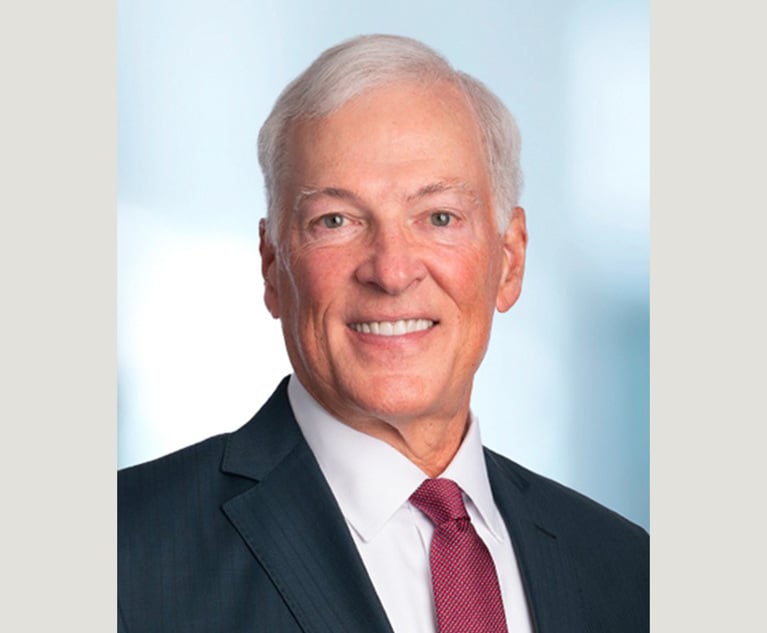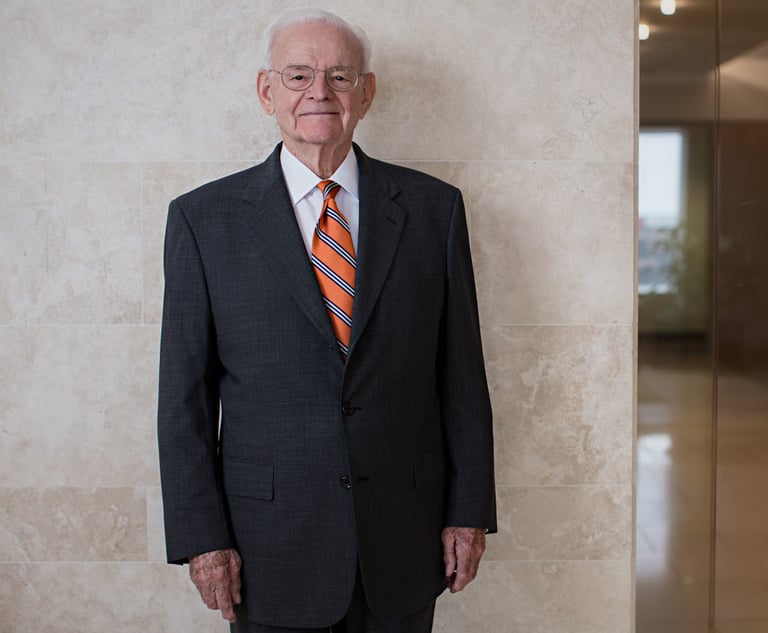 Frank J. Ruggiero, candidate for the Lackawanna County Court of Common Pleas. Courtesy photo
Frank J. Ruggiero, candidate for the Lackawanna County Court of Common Pleas. Courtesy photo Frank Ruggiero Vies for Spot on Lackawanna Court of Common Pleas
The legislature has provided a means by which the law may be changed. That should be the mechanism, not the courts. The courts are not designed to change or make the law.
October 03, 2023 at 03:59 PM
5 minute read
Candidate: Frank J. Ruggiero
Court: Lackawanna County Court of Common Pleas
Party: Democrat and Republican
The following has been edited lightly for length and style.
The Legal Intelligencer: How would you describe your judicial philosophy?
Ruggiero: I often describe myself as a conservative Democrat; socially liberal and fiscally conservative. As such, I am probably more akin to an originalist theory than not. I do not believe courts should legislate. The legislature has provided a means by which the law may be changed. That should be the mechanism, not the courts. The courts are not designed to change or make the law. They are to simply apply the law to the facts presented. That said, my goals are always to leave the seat in a better place than which I found it and to figure out ways to help people when and where legally possible.
The Legal: What makes you the best candidate for the role?
Ruggiero: The Court of Common Pleas judgeships are trial court positions. I have been a practicing trial attorney for 25 years prior to taking the bench. My experiences have afforded me opportunities to practice various areas of law before state, appellate and federal courts across our commonwealth, most notably in the areas of family, criminal, insurance and municipal law.
The Legal: What is the greatest threat to the practice of law or problem the profession faces?
Ruggiero: I believe the greatest threat our profession faces today is internal. I believe that civility, particularly among practitioners, is being set aside and forgotten. I feel much of it originates from the inherent pressures placed on practitioners to be successful in representing their clients. There is sometimes a win at all cost mentality which is understandable when viewing our profession from the standpoint of one's ability to be an effective advocate which is typically measured in terms of "wins" or "losses."
The Legal: What does your party membership say about you and your legal outlook?
Ruggiero: I believe my Democratic ideals allow me to view and decide matters with an eye towards the common good of the whole and in the spirit of finding ways to help parties and help people. My Republican ideals provide a balance which incorporates a conservative approach which, when taken together, allows me to hear, review and decide matters without any political influence or perceived philosophy or bias that may be attached to a particular political party.
The Legal: Do you think courts in Pennsylvania have a perception problem when it comes to appearing partisan or polarized? If so, what would you do to combat this?
Ruggiero: I do not necessarily believe that a perception problem exists at the trial court level. I also do not believe our appellate courts are partisan or polarizing. However, I do believe the issues and cases being heard and decided at the appellate level tend to garner more attention and publicity. By this very nature, perception is more focused on these courts and as we say and know, perception often times is reality. You can not control public opinion. What we can control is the rule of law and the application of the facts to the same. This occurs through application of our rules of procedure, rules of evidence and various statutory and case law available on the subject matter.
The Legal: Several CLEs and bench-bar panels have recently addressed the growing phenomenon of distrust in the courts. In your view, how has distrust in the judiciary created challenges for the bench, and how should judges respond?
Ruggiero: Anytime the impartiality of the court is challenged, it is problematic. Distrust with anything compromises the vitality and veracity of the process. If parties and litigants do not believe or have faith in the process, they will then not believe in the outcomes nor comply with the orders resulting therefrom. If that ever occurs, then we end up with tyranny and chaos. The rule of law is the great equalizer. Stick to the law and apply the law equally as we are required. The end result is then driven by the facts as presented and the application of the law to those facts. Control what we can and do not worry about that which we can not.
The Legal: What factors matter in deciding when recusal is necessary, and would you recuse yourself if a campaign contributor were involved in litigation as a party or attorney before you?
Ruggiero: As with any case involving recusal, the seminal issue is whether there is a conflict or perceived conflict of interest or whether you can remain impartial. I first look to the nature, extent and closeness of the relationship at issue. I next look to the particular facts of the case and determine whether I believe I can hear the case in relation to my prior relationship. If there is any hesitation on my part or with close calls and ties as we say, I would recuse. Otherwise, I would not. I would not necessarily withdraw or recuse if a campaign contributor were involved as a party litigant. That is the nature of the electoral system that we are required to follow. I would, however, apprise the opposing party or counsel of the contribution and determine if they, in fact, have any issue regarding the same.
The Legal: Who are your role models and mentors?
Ruggiero: Mother, father, brother, wife and kids
NOT FOR REPRINT
© 2025 ALM Global, LLC, All Rights Reserved. Request academic re-use from www.copyright.com. All other uses, submit a request to [email protected]. For more information visit Asset & Logo Licensing.
You Might Like
View All
Superior Court Directs Western Pa. Judge to Recuse From Case Over Business Ties to Defendant
3 minute read
Saxton & Stump Lands Newly Retired Ex-Chief Judge From Middle District of Pa.
3 minute read
'Discordant Dots': Why Phila. Zantac Judge Rejected Bid for His Recusal
3 minute read
Judge Louis C. Bechtle: An American Jurist Who Relied on Common Sense, Sound Judgment and Fairness
5 minute readTrending Stories
Who Got The Work
J. Brugh Lower of Gibbons has entered an appearance for industrial equipment supplier Devco Corporation in a pending trademark infringement lawsuit. The suit, accusing the defendant of selling knock-off Graco products, was filed Dec. 18 in New Jersey District Court by Rivkin Radler on behalf of Graco Inc. and Graco Minnesota. The case, assigned to U.S. District Judge Zahid N. Quraishi, is 3:24-cv-11294, Graco Inc. et al v. Devco Corporation.
Who Got The Work
Rebecca Maller-Stein and Kent A. Yalowitz of Arnold & Porter Kaye Scholer have entered their appearances for Hanaco Venture Capital and its executives, Lior Prosor and David Frankel, in a pending securities lawsuit. The action, filed on Dec. 24 in New York Southern District Court by Zell, Aron & Co. on behalf of Goldeneye Advisors, accuses the defendants of negligently and fraudulently managing the plaintiff's $1 million investment. The case, assigned to U.S. District Judge Vernon S. Broderick, is 1:24-cv-09918, Goldeneye Advisors, LLC v. Hanaco Venture Capital, Ltd. et al.
Who Got The Work
Attorneys from A&O Shearman has stepped in as defense counsel for Toronto-Dominion Bank and other defendants in a pending securities class action. The suit, filed Dec. 11 in New York Southern District Court by Bleichmar Fonti & Auld, accuses the defendants of concealing the bank's 'pervasive' deficiencies in regards to its compliance with the Bank Secrecy Act and the quality of its anti-money laundering controls. The case, assigned to U.S. District Judge Arun Subramanian, is 1:24-cv-09445, Gonzalez v. The Toronto-Dominion Bank et al.
Who Got The Work
Crown Castle International, a Pennsylvania company providing shared communications infrastructure, has turned to Luke D. Wolf of Gordon Rees Scully Mansukhani to fend off a pending breach-of-contract lawsuit. The court action, filed Nov. 25 in Michigan Eastern District Court by Hooper Hathaway PC on behalf of The Town Residences LLC, accuses Crown Castle of failing to transfer approximately $30,000 in utility payments from T-Mobile in breach of a roof-top lease and assignment agreement. The case, assigned to U.S. District Judge Susan K. Declercq, is 2:24-cv-13131, The Town Residences LLC v. T-Mobile US, Inc. et al.
Who Got The Work
Wilfred P. Coronato and Daniel M. Schwartz of McCarter & English have stepped in as defense counsel to Electrolux Home Products Inc. in a pending product liability lawsuit. The court action, filed Nov. 26 in New York Eastern District Court by Poulos Lopiccolo PC and Nagel Rice LLP on behalf of David Stern, alleges that the defendant's refrigerators’ drawers and shelving repeatedly break and fall apart within months after purchase. The case, assigned to U.S. District Judge Joan M. Azrack, is 2:24-cv-08204, Stern v. Electrolux Home Products, Inc.
Featured Firms
Law Offices of Gary Martin Hays & Associates, P.C.
(470) 294-1674
Law Offices of Mark E. Salomone
(857) 444-6468
Smith & Hassler
(713) 739-1250





